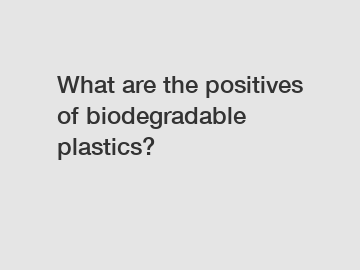What are the positives of biodegradable plastics?
What are the positives of biodegradable plastics?
Biodegradable plastics, as the name suggests, are plastics that can be broken down and decomposed by natural processes over time. These types of plastics have gained significant attention in recent years due to their potential to address the growing concerns of plastic waste and its impact on the environment. The positives of biodegradable plastics are multifaceted and include their biodegradability, reduced carbon footprint, and potential to reduce pollution.
Biodegradable plastics are designed to break down into simpler compounds, such as carbon dioxide, water, and biomass, through natural processes like microbial digestion and exposure to sunlight. Unlike traditional plastics, which can persist in the environment for hundreds of years, biodegradable plastics offer a more sustainable solution by reducing their longevity. This characteristic ensures that these plastics do not contribute to the ever-growing accumulation of plastic waste and its detrimental effects on ecosystems.

The development and use of biodegradable plastics also help in reducing the carbon footprint associated with plastic production and disposal. Traditional plastics are derived from fossil fuels, and their production generates substantial greenhouse gas emissions. By using biodegradable plastics instead, we can significantly reduce the carbon emissions associated with manufacturing and the eventual breakdown of these plastics. This can contribute to mitigating climate change and promoting a more sustainable future.
Furthermore, the shift towards biodegradable plastics can have a positive impact on reducing pollution. Improper disposal of traditional plastics leads to littering and can end up in rivers, oceans, and landfills, causing severe pollution. Biodegradable plastics, on the other hand, provide an opportunity to minimize such pollution risks. They can be disposed of safely without leaving behind long-lasting plastic waste that harms wildlife and ecosystems. Additionally, the decomposition process of biodegradable plastics releases fewer harmful byproducts into the environment compared to traditional plastics.
The increasing adoption of biodegradable plastics also holds significant economic opportunities. With growing consumer awareness and demand for environmentally friendly alternatives, industries producing biodegradable plastics can capitalize on this trend. Moreover, governments around the world are introducing regulations and incentives to promote the use of these sustainable materials, creating a favorable market environment for biodegradable plastic manufacturers.
In conclusion, the positives of biodegradable plastics lie in their ability to break down naturally, reduce carbon emissions, mitigate pollution risks, and stimulate economic development. The shift towards biodegradable plastics aligns with the goals of environmental sustainability and offers an avenue to tackle the concerning issue of plastic waste. By embracing these alternatives, we can move towards a greener and cleaner future.
Are you interested in learning more about resin biodegradable, biodegradable polybags, compostable PBAT plastic? Contact us today to secure an expert consultation!

Comments